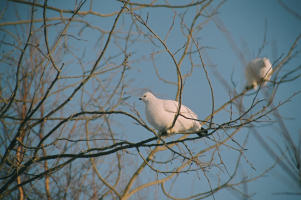Winter weather has just hit here in Maine in the last few days but my four-year-old son Evan has suddenly become an avid proponent of a typically summer game he calls "tennis." Sure, it's not really tennis. It's a game played with a couple of small badminton rackets and a birdie (i.e. shuttlecock to be technical) that we picked up last summer for batting back and forth in the yard. The past few mornings after breakfast and before we leave for work and school, he has lured me into a game of "tennis". We tromp over the light coating of snow on the lawn, swinging wildly to keep the birdie in the air for as many turns as possible. It is good for the heart.
So while we were in the yard this morning, running, jumping, and generally whooping it up, I couldn't help but notice the sounds of birds. A group of Tufted Titmice had arrived in the backyard and were calling vigorously. One flitted up to the top of a tree in my neighbor Bud's lot and even started singing, "peer, peer". A few minutes later I heard the agitated calls of Black-capped Chickadees behind me and turned to see them chasing each other through the boughs of the pine tree behind the garden. As we put the badminton rackets away and got in the car, one chickadee began singing, a behavior that you tend to think of starting in February.
All of this made me think.
Even in the middle of the normal hubbub of human life, the sounds, behaviors, and presence of these birds were telling me about the broader world—the natural world with its never-ending ebb and flow that goes on without concern to whether humans notice it or not. The birds don't try to send us messages to communicate what is happening to them, but they do. And because they have no intention to influence us with their messages, the information we gather from paying attention to them is that much more important. There's no political spin coming from chickadees.
Over the weekend we took Evan and his buddy to see the new penguin movie, Happy Feet, which by-the-way is beating out all competitors at the box office (even the new James Bond flick!). It is a wonderful movie, perfect for maintaining the attention of kids with lots of music, incredible graphics, a great story line, and really very decent attention to the biology. It's kind of cool to think that there will now be millions of kids who know what a skua is, how Emperor penguins incubate their eggs, and even that there are different kinds of penguins. Sure some of them may also be left with the idea that penguins are mostly excellent soul singers and some can tap dance, but that's just part of storytelling.
Especially compelling is that the movie has a strong conservation message. I love the idea that tens of millions of mainstream American parents will be hearing this message and being moved by it when they bring their kids to see what to them is just another popular animated kids movie.
The synopsis of the story is that one misfit penguin discovers the reason why the penguins are not finding enough food anymore—alien beings (humans) are taking all the food from the sea and polluting it as well. The other penguins think he is crazy and they want to just go on with their lives as they have for millennia. The young penguin hero decides he must leave Antarctica and go out and tell the humans so they will stop what they are doing.. I won't tell you the rest of the story but you can imagine the difficulty that a penguin would have in communicating such a message to humans.
 |
The penguins in Antarctica, the chickadees in my backyard, the ptarmigan in Yellowknife, the scoters in San Francisco Bay, the juncos at your feeder, none of them have the capacity to understand that the humans around them decide whether they will have a place to nest or food to eat. Yet they do send us messages if we pay attention. Increases and decreases in their numbers, changes in behavior and timing of life-history events, shifts in diet—there are lots of ways that we can use birds as indicators for tracking environmental health.
Starting December 14th and running through January 5th, Audubon's Christmas Bird Count (CBC)—the world's longest running bird monitoring project--will take place. Over 50,000 volunteers participated last year in the more than 2,000 individual counts scattered from northern Canada to South America (though most are in the U.S. and Canada). The results of the CBC have been used in hundreds of studies, reports and articles to "listen" to the messages birds are telling us about our environment. Recently the CBC has been instrumental in tracking changes in the numbers of many Boreal breeding species that are otherwise difficult to monitor because of the inaccessibility of their remote Boreal breeding habitats.
Participating in a Christmas Bird Count near you is a great way to help listen to the messages that birds are sending us and, hopefully, to make the changes that will help them and us to survive and prosper. If you already participate in a CBC, thanks! If not, anyone can join in and it's easy to get signed-on. Audubon has a website from which you can find the CBC nearest you (click here to see it). And if you have taken your kids, grandchildren, nieces or nephews to see the Happy Feet movie, I'll bet it will be easy to get them to "listen" to the birds on the Christmas Bird Count too!

